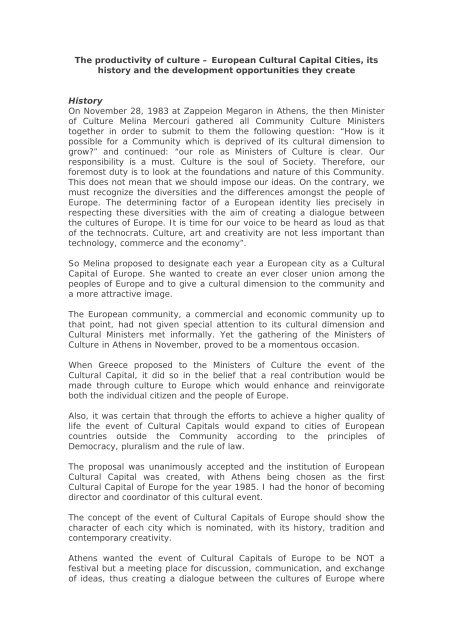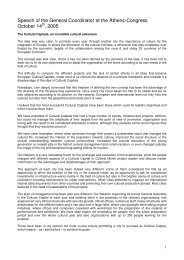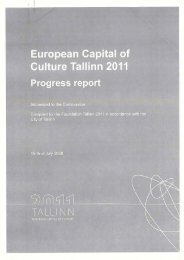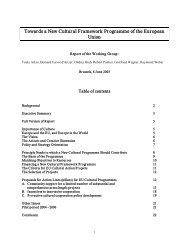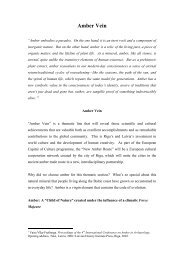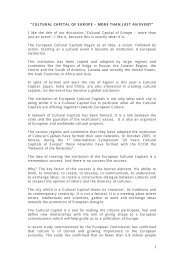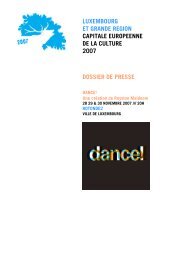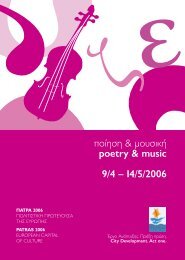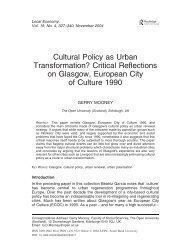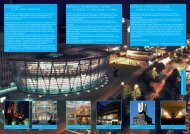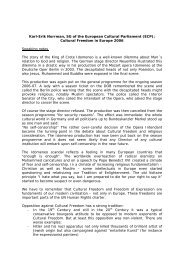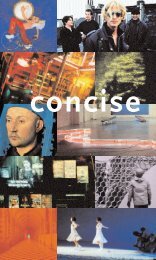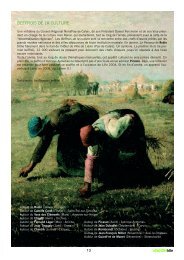Speech - ecoc-doc-athens
Speech - ecoc-doc-athens
Speech - ecoc-doc-athens
You also want an ePaper? Increase the reach of your titles
YUMPU automatically turns print PDFs into web optimized ePapers that Google loves.
4• As part of the May 5 th 2002, Day of Culture an essay competitionwas organised around the theme “Europe’s cultural diversity: athreat or a chance?” 20 European cities participated, whichmeans around 5.000 school children, from 15 – 17 years of age.Pupils from France, Poland and Russia were given awards.• Athens 1 st International Symposium of Cultural Capitals – 20Years of Culturals Capitals of Europe: The Network of CulturalCapitals and Cultural Months of Europe and the Melina MercouriFoundation, with the support of the then Mayor of Athens, Mrs.Dora Bakoyanni, organized a meeting in Athens, 13 – 16 October2005 at the Zappeion Megaron. The dynamism of the institution ofcultural capital cities goes beyond the borders of Europe. Regions,states, people all over the continents are being inspired to createsimilar institutions. The Arab countries - in Africa and Asia; Canada,America, the region of Catalonia, the region of the Volga in Russia,the network of Cities of Culture of Central Europe and the networkof Women Artists of the Mediterranean (F.A.M.) have created theirown cultural networks.On Sunday the 16 th of October at Pnyx (the seat of the ancientAthenian assembly) all the above networks and participants made adeclaration on the importance and their faith in culture, in dialogue,freedom of expression and a respect for the diversities of cultures,especially in a period of terrorism and wars.As a result “the Network of the Networks” was formed.• The Travelling Exhibition: “20 YEARS OF CULTURALCAPITALS - A JOURNEY THROUGHOUT THE WORLD”The exhibition presented in Patras 2006 encompasses 148 panels,750 photos, 22 DVDs, 16 texts (Greek and English) describingprograms and activities by cities when Cultural Capitals, 14 3D items,an Internet Café and the Internet Radio magazine by HeritageRadio Network about European Cultural Capitals.This has given an image and PRESENCE to the network whileinitiating a <strong>doc</strong>umentation of the history of European CulturalCapital Cities by creating an interesting archive and showing it in anInternet Café online in collaboration with heritageradio of the HERMESproject.Furthermore the work on the archive and the collection of items hasto continue. All this will require the cultural cooperation of all cities inorder to achieve an outstanding collection and archive as base forfuture exhibitions and projects.ofThe archive and the collection of the exhibition can become a partEurope’s cultural heritage.
6making the entire area into sustainable tourism. This is why Malaga hasstarted preparing ten years in advance of to 2016.Malaga has began improving its infrastructures and constructing newbuildings. Malaga has created a very large multi cultural centre withexhibition, concert and conference halls. I was invited there to speakabout the history, evolution and impact of the European Cultural CapitalCities and on the experiences of past cultural capitals.At this forum I met Greg Richards, who, together with Bob Palmer, hasdone a very accurate statistical evaluation. I was most impressed withtheir lists on the numbers of people interested in cultural activities. ForEuropean Cultural Capitals 60%, Blockbuster Expos 20%, CulturalOlympiads 12%, World Expos 8%. This shows the magnitude of theimpact of the European Cultural Capital Cities.I had the opportunity to ask this question: whatever you analyze Greg isabout what a city gains by being a cultural capital city e.g. the number oftourists coming to a city, the communication between local people andvisitors, the education and training needed for creating the rightconditions for high quality services; but I did not see anywhere what thevisitors and tourists gain from a cultural capital. This is for me a veryimportant thing to find out. Perhaps a study and a statistical researchshould be done in this field.At the same forum there was Eda Rydzy, a German who was therepresentative of the European Cultural Foundation, and she informed usabout the preparations of the city of Essen. Germany had ten candidatecities and Essen won. They won with the theme “Transformation throughCulture – Culture through Transformation”.As stated in their catalogue:1) “The transformation of the industrial city of Essen into a modernenergy and service metropolis has been both driven andaccompanied by cultural transformation. One of the most significantlocations in the city is the Zollverein colliery to the north, a worldcultural heritage site that is now also to serve as the centralgateway to the venues and events of the 2010 Capital of Culture.”(p.19)2) “Unemployment is high and the development of new economicstructures demands creativity, innovation and the ability to managechange effectively. The 53 towns and cities of the Ruhr will have tojoin forces, so that, in the competition of regions, the Ruhr canprevail as a European metropolis and contribute its specialcompetencies to the Europe of the future.” (p. 21)3) “Its breath-taking development is the result of an approach to thearts that derives from the conviction that culture offers an allembracingenergy capable of sustaining a continuously changingsociety.” (p. 27)4) “The maintenance and cultural appropriation of industrial facilitiespreviously regarded as obsolete means that people are able toretain their history and keep their memories while also enabling the
7realization of a new identity aligned to a new and different future.Post-industrial culture in its purest form is alive and well – andliving in the Ruhr.” (p. 27)These two different cities and countries, Malaga, Spain and Essen,Germany, show us the importance given to culture and to the institutionof Cultural Capital Cities. In every country each candidate city spendsabout 2 million Euros to prepare their dossier. This means employment forthe people preparing the dossiers and money circulating for the purpose ofculture. All this shows the productive element of the process of becominga Cultural Capital of Europe.Today, the developed countries form a global village. Never in the historyof mankind was contact so easy. Every country and every continent isengaged in a continuous communication process. However, it is verydoubtful that this way of communication has achieved much in thepromotion of a constructive dialogue between people and cultures.Our times are dominated by the pursuit of money, and by cynicism,mistrust, fanaticism, racism, fear, insecurity, terrorism and war.Therefore, we must react and believe in the power of culture.We all know that when the growth in material goods is notbalanced by a parallel development of ideas and values, then theway of life produced is condemned to wither and degenerate.Nature, capital and labor are not enough anymore to meet contemporaryneeds. In business and enterprises, there exists an increasing challenge tomanage these new conditions, so as to be able to follow innovation andtechnological change. There is a need to chose qualified people and theright advisors who understand the complexity of social organizations andcan foresee the new demands, whilst, at the same time anticipating thefuture and the unexpected. This requires correct and proper timing foraction, so that people can cope with change.To develop we must adapt ourselves to reality. To use the means that thecontemporary conditions offer to us, and to function in a way that willconvince others in the importance and power of culture for thedevelopment of societies and to make them believe that culture isnot an abstract idea that occupies only the intellectuals but cultureis at the center of our political, economic and social life. Knowledgehas become an essential factor.Fine arts, poetry, drama, music, science are expressions of culture.However, the meaning of culture is much wider and deeper. Civilizationsare formed by what man has said and done since thousands of years agoand which, up to now, have been accepted and absorbed by societies andpeoples and have been added to in their habits, thoughts, actions andmemories.Culture absorbs from the past, moulds the present and shapes the future.
8Culture exists in all our doings, in all our activities. It is knowledge,education, behavior, responsibility, understanding and respect for thediversity and the opinion of others. It is creation, quality and a way of life.We have achieved a lot, but we have not managed to convince the centersof power in their negotiations and their decision making processes to takeinto consideration as much as they should the human being, theenvironment and culture.Our work is difficult. Culture is in any case generated by its power,creating its own momentum. Here lies its perennial strength. Culture hascycles of germination and renewal. It now appears that the power ofculture starts to grow again. I believe that it is this moment which willgive to the institution of Cultural Capital of Europe and the networks, theimpetus to unite their forces and work together for the promotion of thisnoble idea.But we have to consider that the emerging gap between public opinionand the policy of the centres of power is of a great concern. It is “the”outstanding issue according to Noam Chomsky.To bridge it, there is an ever greater need for cultural education not onlyin the sense of promoting literacy and thereby enhancing participation,but as a form of debate to allow people to shape their own destiny andbecome a creative force.When the level of culture, education and intellectual life rises, citizens willunderstand their daily problems more easily. They will evaluate theirproblems better and will face life with greater understanding and showgreater tolerance for the thinking and acting of other people.I want to quote the German Cultural State Minister Bernhard Neumannwho says about cultural education the following:“The involvement with art and culture determine personality and identity.It has a major influence upon individual development, upon thedevelopment of the senses, the formation of creative abilities, theemotional expression, the social competences.”I fully agree.To prove that cultural education is a must in our time, we have to provethe productivity of culture. For this reason the “network of networks” isplanning to organise a symposium with the theme “Productivity ofCulture”.Here I wish to give you an example.Sergei Kirienko, a special envoy of President Putin when he participated inour First International Symposium and now Minister of Atomic Energy ofRussia, said:“The Volga region in Russia, has more than 30 million inhabitants. Peoplerepresenting 142 different ethnic groups and six of the largest
9independent Russian republics, as well as 40% of the Russian Muslims. Ishould stress that in this region we find the border dividing Europe andAsia, the Oral Mountains”. In this region the concept of Cultural Capitalwas adopted with the following impact: “Within half a year of theimplementation of the Project, an enormous change had taken place: thepeople’s mentality had changed. I believe that this is the most importantachievement, which could influence the competitiveness of any region,because in this new innovative economy, the most important resource isthe human being, and not the industry”.The ECCM presented the exhibition “Twenty Years of History – EuropeanCultural Capital Cities” last march in Patras, this year’s cultural capital.More than 10 Greek students from the University of Patras under theguidance and coordination of Professor Haritantis have worked at theinternet café. The ECCM and these students from Patras collaborated withyoung people that came from Germany and other countries. It waswonderful to see all these young people working together. All of themwere very enthusiastic to participate in this program. The young peoplewho came from abroad were very dedicated to the Hermes program, likeJan Brueggemeier, the coordinator of Heritageradio and all the others whocame to Patras to make a proposal about future collaboration. I want tostress the importance of the Hermes project and about the experiences Ihave had so far with this project. I know how difficult it is to find moneyto continue this tremendous work which has began achieving so much.The magazine by heritageradio about European Cultural Capital Cities isan excellent example of this. It must not cease.We must all make sure these young people have a chance to continuedeveloping what they have set out to do in this modern and indeed globalsociety in which communication is so important.Much must be done to continue this project. Europe needs a voice inwhich culture and cultural heritage are brought together, thus broadeningthe horizon of the young people. Only when people get involved andparticipate in the development of Europe, has Europe a future.Our times demand that Europe becomes more powerful. It is imperativethat Europe should create the necessary structures to allow her to have astrong political presence.It is time for Europe to have its own independent voice, a political strategyand cultural policy.To bring about a debate, based on cultural knowledge, one needs torecognize that Europe has a great deal to say concerning theunderstanding between peoples, their cultures, their dignity and for thesake of peace to work for the good will and betterment of all mankind.Throughout the ages mankind has consistently sought progress andrenewal.
10In the long history of human civilization there has been a whole series ofrenaissances each one making its contribution to moral and intellectualregeneration and to the betterment of the quality of life.Man is the driving force.But if man wishes to sing again he will have to cast his mind back to theeternal values, he himself created. If he wishes to dream again he willhave to create new values.And who knows? Perhaps the institution of Cultural Capitals and theNetwork of Cultural Capitals and Months of Europe may assist Europe withnew ideas and values so essential for nations, communities and especiallyman.Spyros MercourisHonorary President of the NetworkOf Cultural Capitals & Cultural Months of EuropeWeimar, 7 th of October 2006


